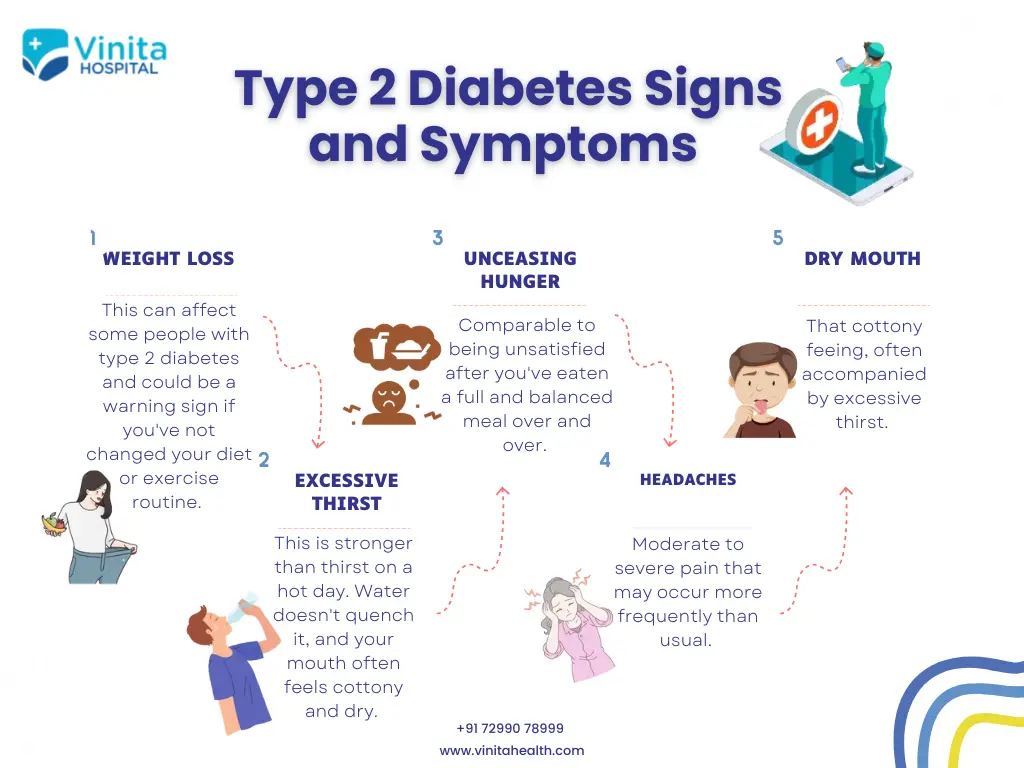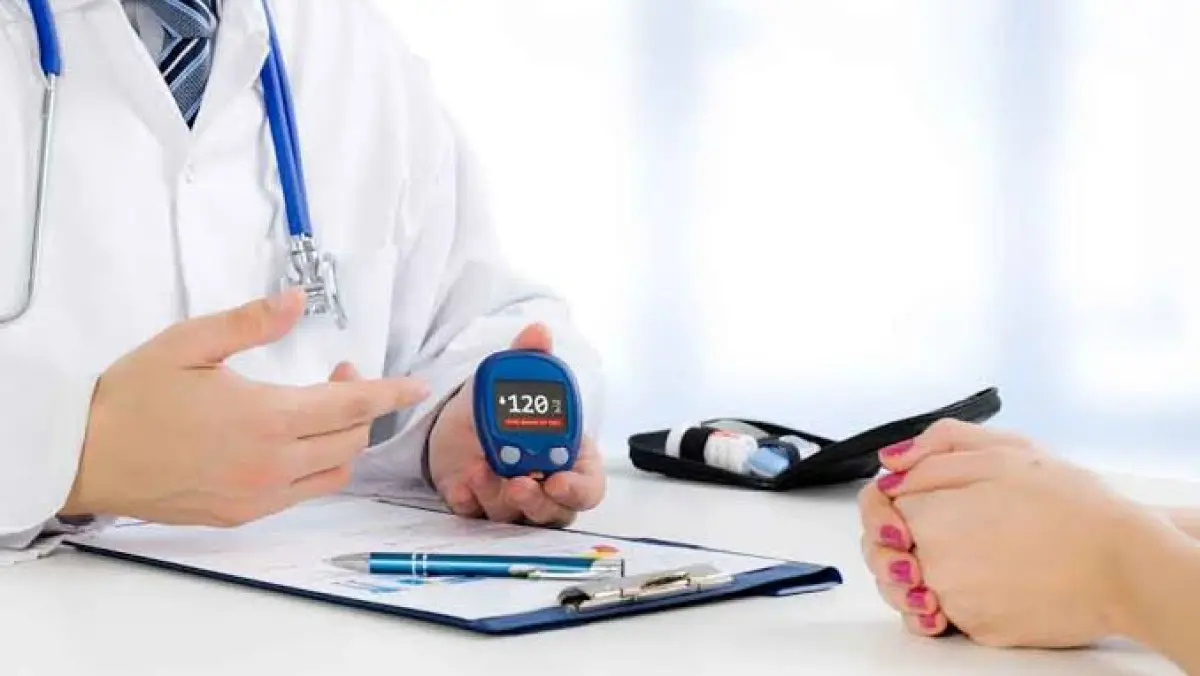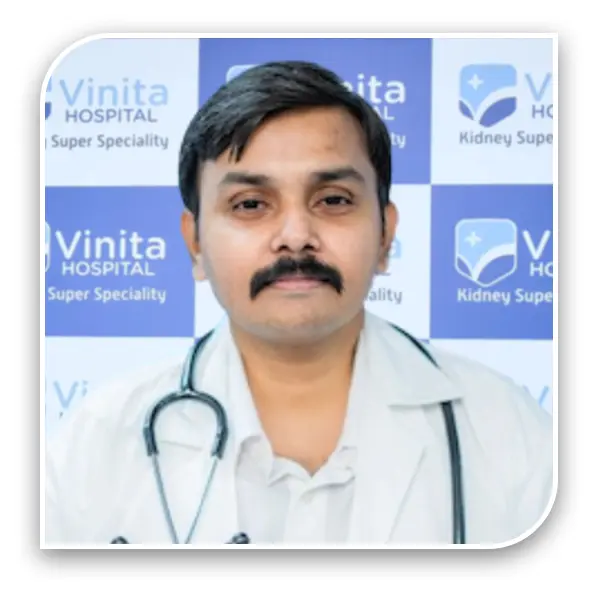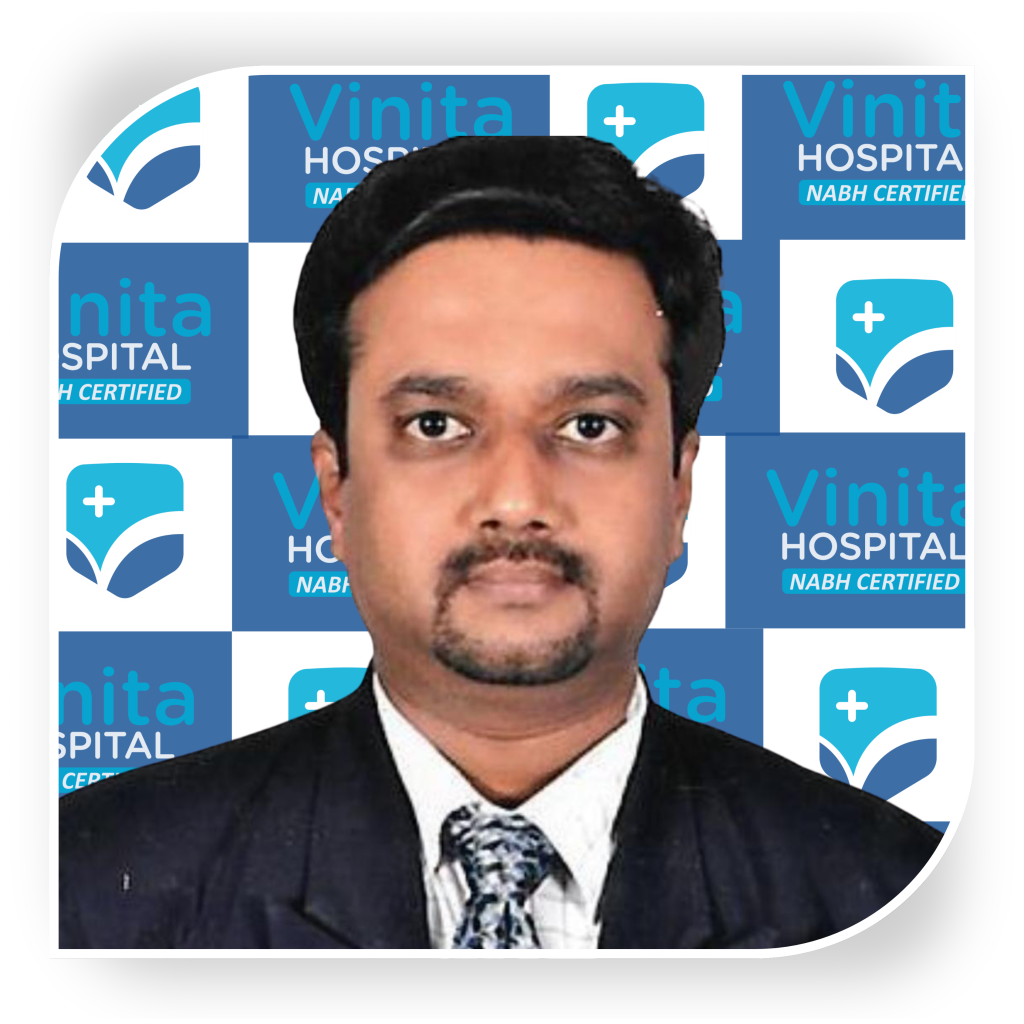The increasing prevalence of diabetes is amongst the growing population, especially in elderly people who deal with multiple conditions. The development of new treatments and technologies is based on the patient’s expectations which have led to a dynamic change in diabetes care in the diabetology hospital in Chennai.
At Vinita Hospital our experts are dedicated to addressing this problem with cutting-edge diabetology services involving equipment used for early screening, providing the best treatment procedures for patient’s cure, and teaching diabetic patients to manage the disease by creating awareness and counseling.
The diabetology hospital in Chennai completely recognizes the need for local services to prioritize standard care and efficiency so that patients with diabetes have access to the full range of diabetes skills and expertise.
Our highly skilled and committed diabetic consultant team at Vinita Hospital delivers a greater amount of routine diabetes care, that includes much of the day-to-day support for many people with diabetes.
The multidisciplinary specialist diabetes team comprises skilled healthcare professionals (Diabetologists, diabetes educators, dieticians, ophthalmologists, podiatrists, diabetes-specific nurses, and other related specialists to remain the hub and spoke of high-quality care for all.
We focus on a holistic approach offering patient-focused care in the best diabetes hospital in Chennai since we believe people with diabetes and its effects should be supported by making necessary lifestyle changes and empowered to care for themselves, wherever possible, through the provision of collaborative care planning along with effective education.
Our Doctors
What is Diabetes?
Diabetes is a group of metabolic disorders by which a person has high levels of blood sugar either because of the improper functioning of the pancreas or because of cells that are unresponsive to the insulin produced.
Its complications are disabling, sometimes life-threatening, and include vision impairment, nerve damage, heart disease, kidney damage, foot damage, and more. The Department of Diabetology in the best diabetology hospital in Chennai offers the latest therapeutic advances for the management and prevention of both Type 1 & 2 Diabetes.
Who is a Diabetologist?
The diabetologist is a medical expert who provides comprehensive treatment for diabetes. He/she generally coordinates between podiatrists, diabetic educators, ophthalmologists, renal physicians, and nurses to educate, treat and monitor a patient. Usually, the best diabetes hospital in Chennai treats patients involving medications either orally or through Insulin injections.
Diabetology Hospital in Chennai
Vinita Hospital
Vinita Hospital stands out as a premier Diabetology Hospital in Chennai, offering a comprehensive range of services for diabetes management and treatment. Renowned for its patient-centric approach, Vinita Hospital combines cutting-edge technology with compassionate care. The hospital provides an array of services, including general medicine, cardiology, and specialized diabetic care. Vinita Hospital ensures that patients receive personalized treatment plans tailored to their specific needs.
Key Specializations:
- Comprehensive Diabetes Management
- Cardiology
- General Medicine
- Advanced Diagnostic Services
Symptoms of Diabetes
- Increased thirst.
- Frequent urination.
- Hunger.
- Fatigue.
- Blurred vision.
- Slow-healing sores or cuts.
- Weight loss.

What Medical Conditions Do Diabetologists Treat?
The diabetologist treats different variations of diabetes as it can vary from person to person depending on the age factor, type of the disease, and medical condition of the patient. Some of the medical conditions treated by the best diabetologist in Chennai include:
1. Diabetes Type I.
2. Diabetes Type II.
3. Treatment for diabetes.
4. Treatment of diabetes involves a multidisciplinary team.
5. Complications of diabetes.
Types of Diabetes
There are several types of diabetes but the most common ones that are treated at the diabetology hospital in Chennai are:
Type 1 Diabetes
Type 1 Diabetes is a condition in which the immune system mistakenly attacks and destroys the insulin-producing cells in the pancreas. It accounts for around 10% of all cases of diabetes and is commonly diagnosed in childhood. Although the exact cause of this auto-immune condition is unknown, there is a strong familial link, and it cannot be prevented.
The symptoms of Type 1 Diabetes include excessive thirst and urination, unexplained weight loss, weakness and fatigue, and blurred vision. Treatment involves managing blood sugar levels through the use of insulin injections several times a day or an insulin pump. Making healthy choices and managing blood sugar levels can help reduce the impact of these complications.

Check out Nutrition and Dietetics in Chennai.
Type 2 Diabetes
Type 2 Diabetes is a chronic health condition that develops gradually, characterized by a progressive decrease in the body’s responsiveness to insulin and a decline in the pancreas’s ability to produce sufficient amounts of insulin. It is the most common type of diabetes, accounting for 85% of all cases, and is associated with modifiable lifestyle risk factors. Additionally, genetic and family-related risk factors can also contribute to the development of Type 2 Diabetes.
While Type 2 Diabetes typically develops in adults over the age of 45, it is becoming increasingly prevalent in younger age groups, including children, adolescents, and young adults. Although there is no known cure for Type 2 Diabetes, it can be effectively managed through lifestyle changes and medication.
Effective management is crucial, as Type 2 Diabetes is a progressive condition that can lead to serious complications. With proper management, individuals with Type 2 Diabetes can reduce their risk of complications and maintain a good quality of life.
Pre-Diabetes
Pre-diabetes refers to a condition where blood glucose levels are elevated but not high enough to be diagnosed with Type 2 Diabetes. Pre-diabetes typically does not have any noticeable signs or symptoms, but it does increase the risk of developing Type 2 Diabetes and cardiovascular disease. Without sustained lifestyle changes, such as adopting a healthy diet, increasing physical activity, and losing weight, approximately one in three people with pre-diabetes will go on to develop Type 2 Diabetes.
There exist two pre-diabetic conditions: Impaired Glucose Tolerance (IGT), characterized by elevated blood glucose levels that are not high enough to meet the criteria for diabetes diagnosis, and Impaired Fasting Glucose (IFG) where blood glucose levels are elevated in the fasting state but not high enough to be classified as diabetes. Taking treatment at the best diabetology hospital in Chennai can help reduce the risk of developing Type 2 Diabetes and other associated complications.
Prediabetes and symptoms
Prediabetes, a precursor to diabetes, may not have any noticeable symptoms. However, some people may experience
- Increased thirst: Unexplained thirst.
- Frequent urination: An excessive need to urinate.
- Tiredness: Persistent tiredness.
- Blurred vision: Changes in vision.
- Slow healing: Delayed wound healing.
- Darkened skin: Acanthosis nigricans, darkened skin in certain areas.
- Increased hunger: Excessive hunger.
Consistent medical examinations are crucial to identify and manage prediabetes at an early stage.
Gestational Diabetes Mellitus (GDM)
Gestational Diabetes Mellitus (GDM) refers to a form of diabetes that may emerge during pregnancy. In most cases, diabetes resolves after the baby is born, but some women may continue to experience high blood glucose levels after delivery. GDM is typically diagnosed when higher than normal blood glucose levels first appear during pregnancy, and women who have risk factors for gestational diabetes should be tested earlier in their pregnancy.
Gestational diabetes can often be managed through healthy eating habits and regular physical activity. However, some women may require medication or insulin injections to help manage their blood glucose levels during pregnancy. It is important for women with gestational diabetes to work closely with their healthcare providers to monitor their blood glucose levels and ensure proper management of the condition.
Diagnostic Tests of Diabetology Hospital in Chennai
The major tests performed in the diabetology hospital in Chennai at Vinita Hospital are to diagnose diabetes with the common tests like:
- FPG (Fasting Plasma Glucose) Test – This is a typical procedure. The patient who undergoes this test should have eaten anything at least eight hours before the test. The diabetes specialist in Chennai will also detect pre-diabetes in this test.
- OGTT (Oral Glucose Tolerance Test) Blood Test – Blood sugar is measured using the OGTT after a patient has fasted for eight hours. After drawing blood, he/she will be given a glucose-containing beverage. This test is performed at the diabetology hospital in Chennai after two hours of having the drink.
- Random Plasma Glucose Test – In a random plasma glucose test, the level of the blood sugar is tested regardless of when the patient ate the meal.
Other Diagnostic Tests Include:
- ECG.
- Doppler and ABI measurement.
- Echo and cardiac autonomic neuropathy screening.
- Biothesiometry.
- Filament testing.
- Podoscopy.
- HCP study.
- Renal ultrasonography.
- Fundoscopy.
- Hormone testing.
- Thyroid biopsy.
- Microalbuminuria renal function tests.
Why should you see a diabetologist?
Seeing a diabetologist is essential for effective diabetes management. These specialists focus on understanding and treating diabetes and ensuring personalized care plans. Regular check-ups help to monitor blood glucose levels, assess complications, and adjust treatment strategies. Diabetologists provide valuable advice on lifestyle changes, medication adjustments, and preventive measures to optimize overall health and minimize the risk of complications associated with diabetes.
Treatment and Services Offered at Vinita Hospital
The advanced treatment procedures and comprehensive services provided in this diabetology hospital in Chennai include:
- Assessment of complications and associated conditions.
- Glucose assessment & control.
- Weight reduction in diabetes.
- Diabetes (Type 1 & Type 2).
- Gestational diabetes.
- Childhood diabetes.
- Obesity in Diabetes.
- Diabetic neuropathy.
- Diabetic nephropathy.
- Diabetic foot.
- Diabetes with hypertension.
- Diabetic retinopathy.
- Lifestyle advice.
- Dietary guidance (Patient education and counseling services).
Prevention of Diabetes
Preventing diabetes, specifically type 2 diabetes, involves adopting a healthy lifestyle and managing risk factors. While type 1 diabetes is not preventable because it is an autoimmune condition, type 2 diabetes, which is more common, is often associated with lifestyle and can often be prevented or delayed. Here are some key steps to help prevent diabetes:
- Maintain a Healthy Weight:
- Achieve and maintain a healthy body weight. Losing even a small amount of weight (5-10% of your body weight) can significantly reduce your risk of developing type 2 diabetes.
- Focus on a balanced diet with appropriate portion sizes.
- Eat a Balanced Diet:
- Consume a diet rich in fruits, vegetables, whole grains, lean proteins, and healthy fats.
- Limit your intake of sugary beverages, processed foods, and foods high in saturated and trans fats.
- Monitor Carbohydrate Intake:
- Be mindful of carbohydrate consumption and choose complex carbohydrates with a low glycemic index (GI).
- Consider consulting with a registered dietitian to develop a personalized meal plan.
- Exercise Regularly:
- Engage in regular physical activity. Aim for at least 150 minutes of moderate-intensity aerobic activity or 75 minutes of vigorous-intensity aerobic activity per week.
- Incorporate strength training exercises into your routine at least two days a week.
- Manage Stress:
- High-stress levels can affect blood sugar levels. Practice stress-reduction techniques such as meditation, yoga, deep breathing, or mindfulness.
- Get Adequate Sleep:
- Aim for 7-9 hours of quality sleep per night. Poor sleep patterns can affect blood sugar regulation and increase diabetes risk.
What’s the association between diabetes and kidney stones?
Diabetes is a condition where your body doesn’t deliver sufficient insulin or can’t utilize it appropriately. Insulin is vital to managing glucose levels. High glucose can create issues in any piece of your body, including your kidney stone treatment.
In the event that you have type 2 diabetes, you might have exceptionally acidic pee.
Why Vinita Hospital?
Our goal at this best diabetology hospital is to encourage patients to receive early specialty care and education and also get them on the right track with their diabetes management before sending them to their primary care physicians for ongoing treatment.
1. Since diabetes affects the blood vessels and nerves of the foot more commonly leading to foot ulcers and loss of the limb subsequently, amputations among diabetic patients are very high due to barefoot walking and poor foot care, especially among the poor. We screen patients daily with the help of advanced instruments such as Bio- thermometers and Doppler to detect peripheral vascular disease or neuropathy along with educating them in proper foot care.
2. Trained surgeons from the plastic surgery department in this best diabetes hospital in Chennai take care of wound treatment and ulcer management.
3. Our diabetes specialist Chennai conducts routine screening for nephropathy, amyotrophy, retinopathy, diabetic gastroparesis, and other diabetic complications.
4. We also offer diabetes podiatry services for the feet before the emergence of foot ulcers. The feet are cared for in this best diabetology hospital in Chennai, by trimming the nails, and corns, removal of calluses, etc.
5. Patients with diabetes are routinely screened by the diabetes specialist Chennai for cardiac disease using baseline ECG and serum cholesterol so that proper treatment can be initiated.
6. We have 24-hour laboratory facilities to undertake all types of biochemical tests like apo protean studies, lipid profiles, blood sugar estimation, etc.
7. We offer diagnostic insulin pump classes, continuous glucose monitoring evaluation, and initiation.
8. Patients with Type 1 and Type 2 diabetes or high-risk patients with diabetes (i.e. diabetics who experienced a heart attack or underwent bypass surgery recently), can also be treated in our diabetology department for seamless, and intensive management of their disease.
9. Our best diabetology hospital in Chennai admits diabetic emergencies in the ICCU. Women suffering from diabetes are closely monitored to keep their blood sugar levels in check, in case of planning to conceive or are pregnant.
Conclusion
If you or your loved one is in need of proper diabetic care, you can approach Vinita Hospital as our experts in this best diabetology hospital in Chennai offer extensive medical procedures to outbound and inbound patients by working together to help all our patients for a speedy recovery.
Read also Dialysis Hospital in Chennai.





